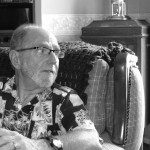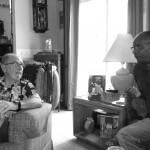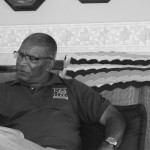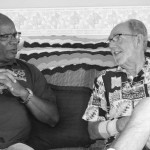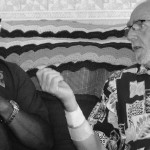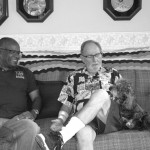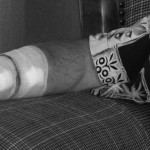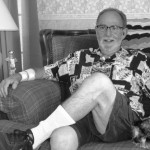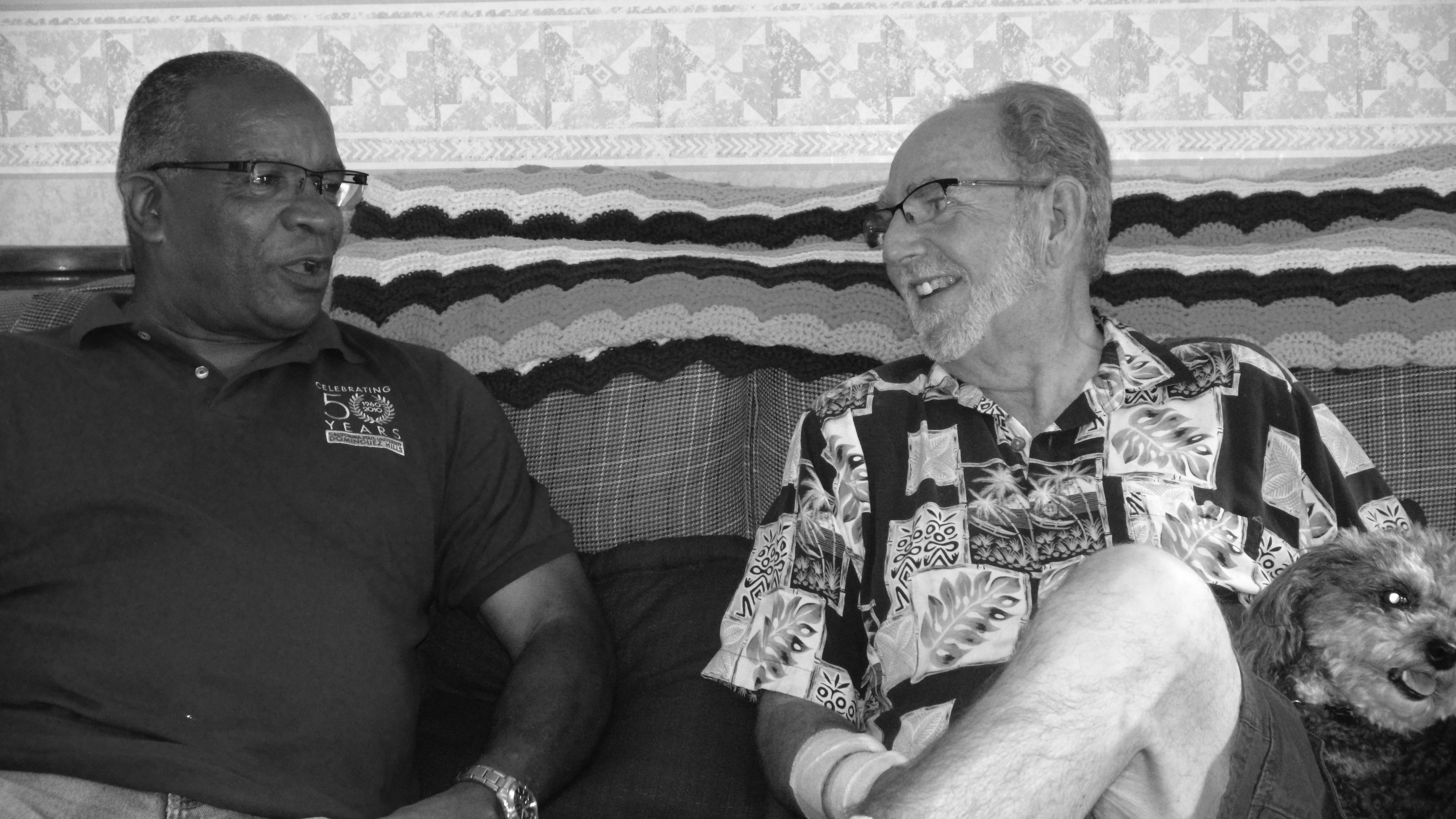
Long time friends support each other through diabetes and strokes
Living with diabetes from Alicia Edquist on Vimeo.
Gary Head and Ron Roberson have been friends for more than 13 years and had no idea that they would become such a support for one another through the medical issues both of them have faced in the last year.
Head, 60 years old and Roberson, 64 years old are a support group for one another along with other friends. Head was diagnosed with Type 1 diabetes and Renal Failure and Roberson has had several mini strokes and one major stroke. Both men’s diseases has caused them to change their eating and exercise habits as well as support one another through the medical issues.
According to the Center for Disease Control, diabetes and strokes are two of the ten leading causes of death for Americans according to the 2010 report.
The men meet each Sunday for Breakfast with a couple other friends and spend time talking about what is going on with them, exchange ideas, what they have been eating and new finds for food items that contain low salt or sugar but still have flavor. It has been a good support for them as they go through health issues.
Last November was a turning point for Head; he came home from work at Costco and took a shower. After his shower he took his blood sugar, it had dropped to 55 and he passed out in the bathroom.
“I could hear the phone ringing and couldn’t get to it, couldn’t move. My wife was coming in the house, she called the paramedics and the neighbors came over. I went to the hospital,” he said.
He was in there for three days and the doctors were able to get his blood sugar stabilized but that was only the beginning.
The following Tuesday, his wife noticed that he was not steady on his feet and decided to take him back to the hospital. Once he got back in there they started to do blood work, it just so happened that he had got a kidney doctor that day.
“The doctor told me, you are going to be dead in 48 hours if we don’t put you on dialysis,” Head said.
He had a blood disease and did not know it. He has renal failure, commonly known as kidney failure and is on the kidney transplant list. According to Head, it’s a five to seven year wait to get a kidney transplant. Once he gets the transplant, he will still be diabetic but he won’t need to do dialysis anymore.
Since then he now goes to dialysis three days a week for four and a half hours a day.
“With dialysis, a lot of people say it makes them tired, me I have more energy and I don’t feel tired at all anymore,” he said.
He said that his diabetes is now under control and he monitors his blood sugar about nine times a day.
“You learn to eat right and you cut out the junk food that you used to eat. You get to the point where you do not crave In-N-Out. You adjust your eating habits. You begin not to miss that stuff anymore,” Head said.
It has even affected his wife and son, according to Head, they are on him all the time about making sure he eats the right things.
He has a great support from his family, the people at dialysis, people from work and his friends. People around him ask questions about what he is going through and how you are taking care of yourself.
“If people want to (change their eating habits) and they have diabetes, they are going to do it,” he said.
The biggest lesson for Head out of all this is to take care of yourself, watching what you eat and exercise.
He has been off of work and is looking forward to going back to work in October at Costco.
Roberson’s life after strokes
Roberson is a retired reporter for CNN Headline News local edition and TWC Entertainment and also recently retired from being a pastor.
According to Roberson, he has always worked out and been in decent shape for most of his life. More than a year ago, he went in for a check up found out that he had high blood pressure and needed to do something about it.
“They call high blood pressure the silent killer because it often doesn’t show any symptoms and at your wellest moment you could be sick enough to die,” Roberson said.
He didn’t really listen to the doctor and was given some pills to take, but he did not like taking pills and preferred to do it naturally if he could.
He took the pills for a couple days but they started to make him feel a little funny so stopped taking them and went about his business.
Roberson had a couple warning signs before his major stroke. He was on his way taking his kids to basketball practice and was driving and couldn’t get out the car, his hands were frozen to the wheel and he stiffened up. When he was able to get his hands off the wheel he felt numbness in his legs, stood up and waited and it went away and continued on with his day.
“I never really took heed to the warnings, several warnings came to me and never to heed to them,” Roberson said.
One night, a year ago, he got up to go use the bathroom, put his feet on the floor and felt a little numbness in his leg but he thought he had just been sleeping wrong and felt a little light headed but just thought he sat up too quick. He sat on the bed for a few second waiting for it to go away and when he stood up he totally collapsed.
“I fell right on my face and was on the ground trying to fidget around and was losing all control of his right side but had control of his left side,” he said.
He remembers he was breathing while being on the floor, but he knew something was wrong, “I could literally feel life leaving me,” he said.
Being a Christian, he began to cry out to God and everyone else and finally made it back to his bed. He propped himself up in the bed and lay down and went back to sleep which he notes is a bad thing to do.
He got through the night and when he woke up he had a little feeling in his legs but he was still a little numb and he went straight to the hospital.
“Wow, it changed my life, whenever you have a life and death experience, it’s a wake up call to you and you get the message loud and clear if you have any kind of sense at all,” Roberson said.
This is where life began to change for Roberson who decided that he wanted to live because he has two young kids and wants to be here for them.
He started changing his diet and exercise habits. He has increased his exercise and diet by adding green vegetables, less red meat and currently going the whole month by not eating any red meats.
Since the diet and exercise change he is feeling great and alive. He is completely recovered and has not had any more mini or major strokes since the first major one.
He has been modifying his medication, “I found that the more I take care of myself physically, what my food intake is and my exercising the less I have to use the medication,” Roberson said.
“So people around you begin to change as well and become somewhat your support group,” Roberson said.
Roberson’s body was screaming out during the adjustment period when changing his diet and eventually his body adjusted to the new eating habits.
He feels the greatest impact this has had on his life is by him going through this, he is now able to impart this information to others and help other people make the changes.
Life After Strokes from Alicia Edquist on Vimeo.
Making changes for the good
Some Americans are turning to health and nutrition coaches to help make diet and lifestyle changes.
Kristina Jackson, is certified health coach, notes that it is important to consult with your regular doctor prior to making any diet or lifestyle changes.
Taking a look at diet changes is important for those going through health issues.
“We should all consume more ‘whole foods’ that are as close to their natural state as possible. Processed and refined foods contain large amounts of sugar, salt and artificial ingredients that contribute to weight gain which can lead to insulin resistance and possibly diabetes,” she said.
Jackson enjoys being able to help people make life changes that can have a lasting effect on their lives.
“I love what I do. I have the opportunity to witness people completely change their lives and health by making simple changes to their everyday lives. It doesn’t have to be all or nothing. Small, incremental changes all add up and make a huge difference. But it’s about first making the commitment to your health, and taking that first step,” Jackson said.
